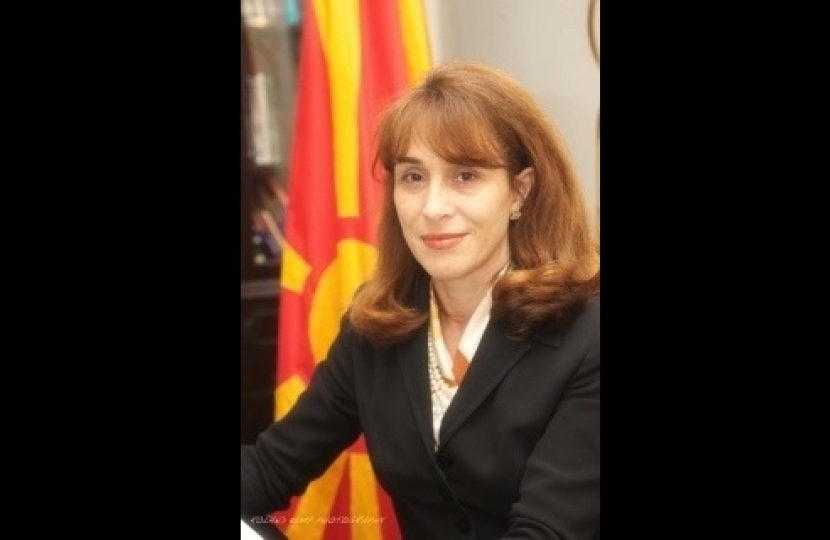
HE Ambassador Marija Efremova
Text of speech to the Council
Conservative Foreign and Commonwealth Council, House of Commons , 14 November 2011
Foreign relations and recent history of the Republic of Macedonia
Sir Ronald Halstead
Dear members of Conservative foreign and commonwealth council Ladies and Gentlemen,
Ladies and Gentlemen
Let me begin by thanking our host and the organizers for inviting me to give a talk this evening. It is a wonderful experience to join you at this beautiful venue at House of Commons. I am especially pleased to have been invited by Hon Secretary, Mrs. Melissa Crawshay-Williams to give a short speech about the foreign relation and recent history of my country. I consider this interest in my country as an honor to all the people of the Republic of Macedonia and therefore, I am greatly privileged by the opportunity to deliver this speech today.
……………………………..
In the last 17 years NATO and EU integration have been a major goal for the Republic of Macedonia. Euro-Atlantic integration has become our top foreign policy priority. The Republic of Macedonia applied for membership in the European Union in 2004 and obtained candidate status in December 2005, during the British presidency with the European Union. Since then the country has attained significant results in the implementation of the European reform agenda and is awaiting the initiation of the negotiations with the European Union.
Since 2009 European Commission has been recommending to the Council of the European Union that negotiations should be opened.
In 2009 and 2010 the decision making process in the Council was postponed from one Presidency to the next due to a consideration that a mutually acceptable solution to the name dispute with Greece is imminent.
We are expecting decision of European Council in December 2011 to open accession negotiations. The Council decision to open accession talks could set screening exercise as an indicative timeframe for reaching a mutually acceptable solution to the name issue with Greece.
Delaying further the decision making process with the Council on the start of the accession talks with Macedonia will not help the efforts to resolve the name dispute.
Setting an indicative timeframe for reaching a mutually acceptable solution in the context of a Council decision on launching the accession negotiations while pursuing the screening process, could inspire positive developments.
Moreover, such a decision would positively influence the reform dynamics and the inter-ethnic cohesion in Macedonia, as well as the overall regional stability.
To arrive without any further delay to a mutually acceptable solution that will not harm the national, linguistic and cultural self-identification of neither the Macedonian nor the Greek people, requires that both sides proactively and constructively contribute to the name talks. The Greek side, being full occupied with managing the consequences of the debt crisis, does not do so.
Respecting national identities and cultural, religious and linguistic diversity is at the core of the European project. These core values of European integration need to be upheld and fostered to and from EU institutions, member states and enlargement countries alike.
While understanding the difficult time that Greece endures, the cost of the Greek inactivity and defocus from the name talks is solely paid by Macedonia, and at a very high price.
The history of the enlargement process is full of evidence that the EU has offered its assistance in the search for solutions to open bilateral issues between member states and candidate countries by providing adequate political stimulus to do so throughout the accession negotiations process. We have seen good examples of this kind in our region. Slovenia and Croatia had set a positive model by reaching s mutually acceptable agreement and linking its enforcement with the attainment of the EU membership.
We ask EU member states, in particular Greece as the oldest member state in our region and a declared friend of enlargement, to support the decision for starting accession talks with Macedonia and thus positively influence the reform dynamics and the inter-ethnic cohesion in country, as well as the overall regional stability.
Regarding membership in NATO, the Republic of Macedonia has fulfilled all the necessary criteria and has implemented the required reforms. In addition, Macedonian military forces have participated and continue to participate in the NATO-led operations in Afghanistan and Iraq. For these reasons, it was expected that the country will receive an invitation for full membership, together with Croatia and Albania, during the NATO Bucharest Summit in April 2008. However, despite the recognition of our progress and our dedication to the activities and values of NATO, the Republic of Macedonia was not invited to become a member country. Due to the opposition from Greece, the Alliance decided to send the invitation after the name dispute has been resolved. To this end, talks on the name issue continue to be conducted under the auspices of the United Nations. The admission of the Republic of Macedonia into NATO is extremely important, since it would guarantee long-term stability and security not only for the Balkans, but also for the whole South-Eastern European region.
Having in consideration all of that, this year is expected to be another historical year for the Republic of Macedonia, a year when we hope to fulfil our foreign-policy priorities, including NATO membership, commencement of the negotiations for full-fledged membership in the European Union and resolution of the issue of the name difference imposed by our southern neighbour.
In addition, despite the current economic crisis, Macedonia has a economic growth and we hope to attract more foreign investments, which is one of the priority goals of the present Macedonian government. The country has a lot to offer.
